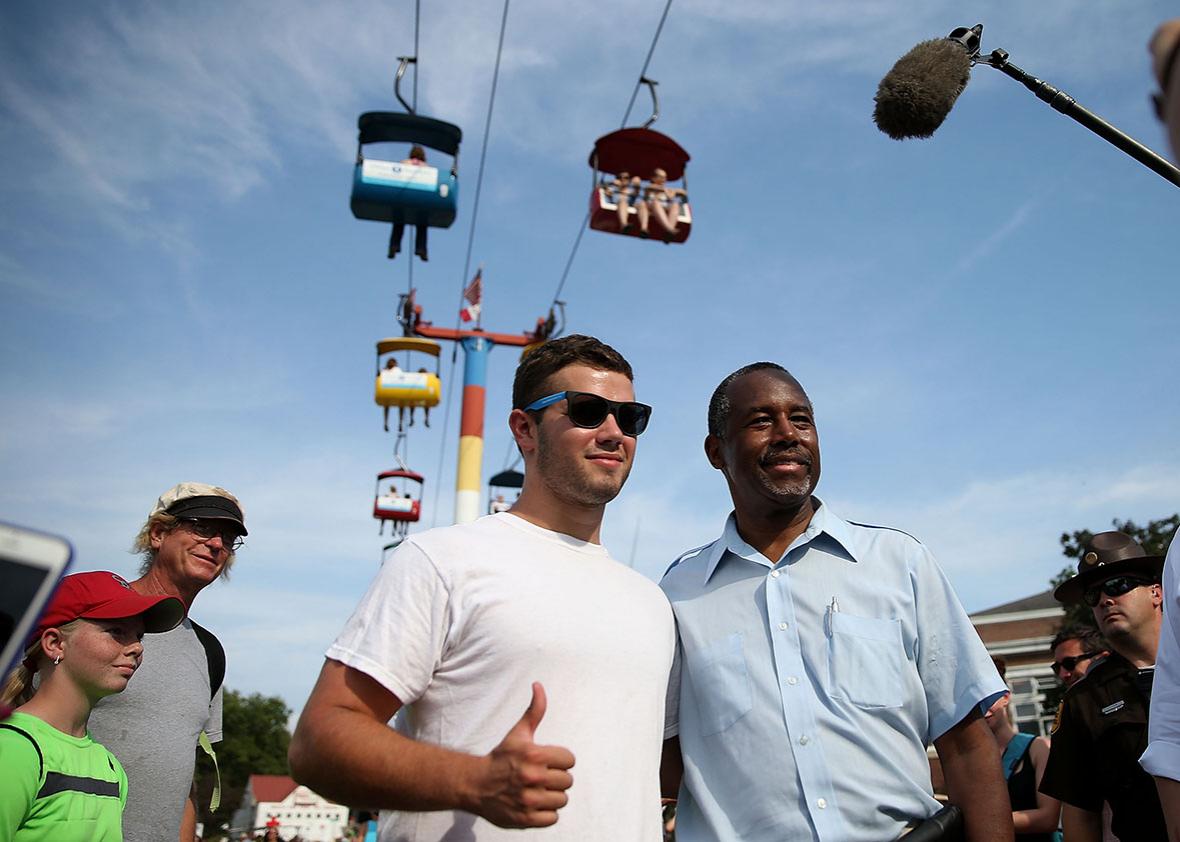Donald Trump has some company atop the field in Iowa, per the latest polls of the first caucus state. It is neither Wisconsin Gov. Scott Walker, who lorded over the Iowa caucus polls for most of the year, nor Sen. Ted Cruz, the steady conservative heartthrob. Mike Huckabee and Rick Santorum, the previous two winners of the caucuses, are nowhere.
Instead it’s “Commentator and Doctor Ben Carson,” as Monmouth University describes him in its latest polling questionnaire, who’s enjoying a modest surge in the heartland. Carson, the soft-spoken retired neurosurgeon who has spent the past couple of years enjoying the lucrative lifestyle of a conservative circuit speaker, is now tied with Trump at 23 percent. And in a Bloomberg Politics/Des Moines Register poll released this past weekend, Carson placed second with 18 percent to Trump’s 23 percent.
Carly Fiorina, the former Hewlett-Packard CEO who broke out at the “kids’ table” debate in early August, has also vaulted past Walker in the Monmouth poll, reaching third place at 10 percent.
Iowa Republicans have spent the summer watching 17 presidential candidates sport blue jeans and eat fried sugar-lard in order to secure their support. After all of it, the overriding feeling right now appears to be: If you’ve held political office before, then these are lean times.
“Regardless of who you support,” the new Monmouth survey asks, “what do you think the country needs more in the next president: someone with government experience who knows how to get things done OR someone outside of government who can bring a new approach to Washington?” Twenty-three percent of Iowans preferred the former, 66 percent the latter—and Trump, Carson, and Fiorina, naturally, are soaking up those votes.
No past or present officeholders—whether they are perceived as establishment or anti-establishment candidates—are catching fire in Iowa. We can all agree that Cruz or Huckabee play up their anti-establishment credentials, but they’re not faring much better in Iowa than the likes of Jeb Bush or Sen. Marco Rubio. That isn’t the rift that matters right now. It’s between politicians and nonpoliticians.
For this, as with most things, we can thank Trump. His well-publicized rhetoric against “all talk, no action” politicians who are “stupid” and so on opened a great wide lane down which he, Carson, and Fiorina have been speeding. Anger-prone voters who once directed their rage at the GOP establishment still do that, but the Summer of Trump has now conditioned them to widen that circle to include all politicians.
This is what makes a strategic rethink like the one Walker is attempting so irrelevant. Walker’s precipitous collapse in Iowa, where he had been leading just long enough to solidify expectations that he needed to win it, set off some bells on his team. It was time to retire “Fortress Walker,” the overprotected, monotonous black hole of charisma who’d been coasting off the inertia of a single, rousing speech in January. Trump had applied the necessary friction to slow Walker’s Iowa coronation, and Walker’s response would be to adopt a more “Trump-like” tone “in which he would take on the Republican establishment.”
But Trumpism, when harnessed by non-Trump actors, can badly misfire. It is a dark magic that takes control over its practitioner and leads him to a place where he’s describing the construction of a 5,000-plus-mile-long wall with Canada as a “legitimate” idea. And so on.
Adopting a tone more “fiery,” “anti-establishment,” “confrontational,” or whatever other inexact term we use to describe a politician who’s made the decision to irrationally please base voters misdiagnoses the moment. Walker has been running for office since he was 22 years old and serving since he was 25. He is a career politician whether he likes it or not. It’s not a good look right now.
You can understand the temptation for Walker, Bush, or any other viable candidate to start smashing lamps or burning Chinese flags. But the best bet is still just to hold steady, not overreact, and wait for the nonpoliticians to crash. Heightened scrutiny and the compression of time typically serve as a career politician’s best friend. Pat Buchanan and Steve Forbes and Herman Cain had their moments, maybe even won a state, but in the end a majority of voters would not entrust them with the nuclear codes, the American military, and oversight of the vast federal bureaucracy.
Let the nonpoliticians have the summer to themselves. Let them have Iowa, even! But definitely don’t try to become them.
Read more of Slate’s coverage of the 2016 campaign.
